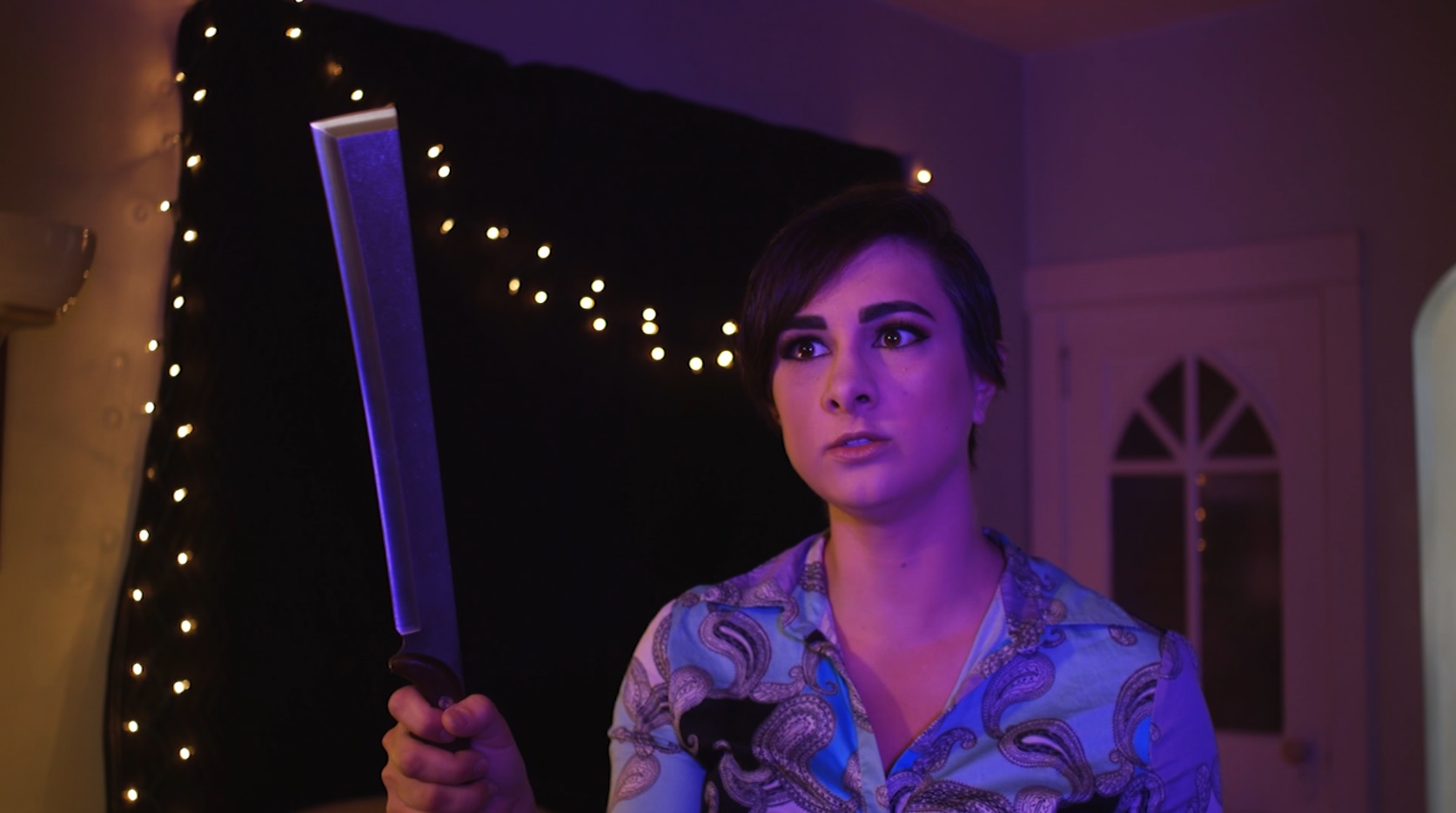Editorials
Unauthorized Exorcisms: The Terrifying Tragedy of ‘Godless: The Eastfield Exorcism’

Warning: This article contains movie spoilers.
“You’re like one of those brainwashed missionaries,” Georgia Eyers’ character Lara fumes to her husband Ron (Dan Ewing). Her remark cuts deep into Ron’s faith. But he never wavers. He doubles down on his delusions, even if they harm those he loves. The conversation, during which Lara convulses and seemingly switches personalities, brings up questions about blind religion, science, and mental health. Throughout Godless: The Eastfield Exorcism, director Nick Kozakis confronts extremism and how it so easily spreads like a contagion.
Set in 1994, the film takes place in Eastfield, Australia and follows Lara and Ron as they contend with Lara’s ailing mental health and Ron’s belief that it’s a spiritual matter. Lara has been found more than once dancing naked on the front lawn. She’s been hallucinating, mostly images of a horned beast with scaly, fiery-red skin. While Ron believes she’s possessed by demons, Dr. Walsh (Eliza Matengu) diagnoses Lara with hypomania and paranoid schizophrenia. Ron presses the doctor to sign off on a psychiatrist statement that will allow Father Argento to perform an exorcism. Still, Walsh refuses, as she firmly states the issue is a medical one. “They want to scare you to sell more pills,” seethes Ron in one of several sessions.
Out of options, Ron turns to a member of the congregation named Barbara (Rosie Traynor), who suggests Daniel James King (Tim Pocock) be summoned. He’s known for his extreme approach, physical and psychological torture all in the name of God. When he arrives, he orders Ron to restrain “it,” as he refers to a “possessed” Lara, also demanding no feeding and no bathing during the proceedings. “We need to keep you safe,” consoles Ron, as he ties Lara’s hands with rope. She momentarily breaks free – but Daniel snatches her in his veiny arms and drags her out to a nearby garage. There, he binds Lara to a chair, while declaring he “will break you all.” All in this case refers to what he believes to be several demons inside her body
“Lara’s not just possessed; she’s infested,” he says.
Throughout the film, Daniel whips Lara with a leatherbound Bible, deprives her of food, and emotionally traumatizes her through claims she is pure evil. After escaping for a brief period, Ron discovers his wife twirling alone in a field – here the audience witnesses a vision she has about the same horned beast and a burning inverse cross. “I just hate seeing you suffer,” Ron says, taking her into his arms. He then returns her to the garage, and the grueling torture continues. What happens next is most agonizing. She’s eventually removed from the chair, and Daniel and his parishioners hold her down and douse her with water, in an almost water-boarding exercise. Things quickly escalate as the congregation places hands on her body to push out the demons. Daniel grabs her neck before sliding his hands to her jawline and rips it open, effectively killing her. It’s one of the year’s most shocking and uncomfortable scenes that is nothing short of devastating.
What makes Godless such an effective chiller is how grounded it is. It’s unlike most exorcism films. It’s far removed from the polished Hollywood fare. Instead, it’s gritty and raw, rooted in authentic storytelling around religious fanaticism and one woman’s tragic death. It also helps that it draws inspiration from real-life exorcisms. Eerily enough, a woman named Joan Vollmer died under similar circumstances. In 1993, her husband Ralph and three others – David Klingner, Leanne Merlyn Reichenbach, and Matthew Paul Nuske – were put on trial for Joan’s death. According to a newspaper report, Joan had been tied to a chair and “bound by stockings.” Dr. Stanley Pilbeam conducted an autopsy and believed it was “most likely that she died from a cardiac arrest caused by compression to the neck.” But he wasn’t totally certain of this and so the court ruled there wasn’t sufficient evidence to indicate the four in question contributed directly to Joan’s death. When they walked free, Ralph praised the ruling, stating that “the magistrate’s finding was the will of God.” How sickening.

But this case isn’t the only one from which inspiration is drawn. In the film’s end credits, Kozakis lists several names of people who were killed during unauthorized exorcisms. One of those is Janet Moses, on whom Belief: The Possession of Janet Moses is based, as well as countless other names like E’Dena Hines of New York City and Israa Zourob of Palestine. The list also includes an infant and a three-year-old. Senseless deaths that could have been avoided.
Godless: The Eastfield Exorcism is not for the faint of heart. Its grim portrayal of exorcisms makes it one of the year’s best horror films – relentlessly infuriating, disheartening, and sad. With a script written by Alexander Angliss-Wilson, Nick Kozakis’ film ventures deep into the bowels of real life in a way that weighs on your soul. “While I was studying and researching exorcisms, I realized how brutal and horrifying the real ones are, and what really happens in most cases. That knowledge was too hard to shake and overlook,” Kozakis told Fangoria.
Such a brutal reality leaves you deathly cold, unable to shake the ending. From the opening scene, in which the viewer witnesses zealots participating in a revival, to the final title card, Godless arrests the senses and leaves nothing but darkness in its wake. Where even films like The Exorcist deliver a heightened reality through head-spinning and green pea-soup vomit, Godless swaps out grandiose for something real and tangible. Like it could actually happen. That’s the real horror. This can and does happen – and it’s probably happening as I type this.
It’s chilling just to think about.
Godless: The Eastfield Exorcism is now streaming on Tubi.


Editorials
Silly, Self-Aware ‘Amityville Christmas Vacation’ Is a Welcome Change of Pace [The Amityville IP]

Twice a month Joe Lipsett will dissect a new Amityville Horror film to explore how the “franchise” has evolved in increasingly ludicrous directions. This is “The Amityville IP.”
After a number of bloated runtimes and technically inept entries, it’s something of a relief to watch Amityville Christmas Vacation (2022). The 55-minute film doesn’t even try to hit feature length, which is a wise decision for a film with a slight, but enjoyable premise.
The amusingly self-aware comedy is written and directed by Steve Rudzinski, who also stars as protagonist Wally Griswold. The premise is simple: a newspaper article celebrating the hero cop catches the attention of B’n’B owner Samantha (Marci Leigh), who lures Wally to Amityville under the false claim that he’s won a free Christmas stay.
Naturally it turns out that the house is haunted by a vengeful ghost named Jessica D’Angelo (Aleen Isley), but instead of murdering him like the other guests, Jessica winds up falling in love with him.

Several other recent Amityville films, including Amityville Cop and Amityville in Space, have leaned into comedy, albeit to varying degrees of success. Amityville Christmas Vacation is arguably the most successful because, despite its hit/miss joke ratio, at least the film acknowledges its inherent silliness and never takes itself seriously.
In this capacity, the film is more comedy than horror (the closest comparison is probably Amityville Vibrator, which blended hard-core erotica with references to other titles in the “series”). The jokes here are enjoyably varied: Wally glibly acknowledges his racism and excessive use of force in a way that reflects the real world culture shift around criticisms of police work; the last names of the lovers, as well the title of the film, are obvious homages to the National Lampoon’s holiday film; and the narrative embodies the usual festive tropes of Hallmark and Lifetime Christmas movies.
This self-awareness buys the film a certain amount of goodwill, which is vital considering Rudzinski’s clear budgetary limitations. Jessica’s ghost make-up is pretty basic, the action is practically non-existent, and the whole film essentially takes place in a single location. These elements are forgivable, though audiences whose funny bone isn’t tickled will find the basic narrative, low stakes, and amateur acting too glaring to overlook. It must be acknowledged that in spite of its brief runtime, there’s still an undeniable feeling of padding in certain dialogue exchanges and sequences.

Despite this, there’s plenty to like about Amityville Christmas Vacation.
Rudzinski is the clear stand-out here. Wally is a goof: he’s incredibly slow on the uptake and obsessed with his cat Whiskers. The early portions of the film lean on Wally’s inherent likeability and Rudzinski shares an easy charm with co-star Isley, although her performance is a bit more one-note (Jessica is mostly confused by the idiot who has wandered into her midst).
Falling somewhere in the middle are Ben Dietels as Rick (Ben Dietels), Wally’s pathetic co-worker who has invented a family to spend the holidays with, and Zelda (Autumn Ivy), the supernatural case worker that Jessica Zooms with for advice on how to negotiate her newfound situation.
The other actors are less successful, particularly Garrett Hunter as ghost hunter Creighton Spool (Scott Lewis), as well as Samantha, the home owner. Leigh, in particular, barely makes an impression and there’s absolutely no bite in her jealous threats in the last act.
Like most comedies, audience mileage will vary depending on their tolerance for low-brow jokes. If the idea of Wally chastising and giving himself a pep talk out loud in front of Jessica isn’t funny, Amityville Christmas Vacation likely isn’t for you. As it stands, the film’s success rate is approximately 50/50: for every amusing joke, there’s another one that misses the mark.
Despite this – or perhaps because of the film’s proximity to the recent glut of terrible entries – Amityville Christmas Vacation is a welcome breath of fresh air. It’s not a great film, but it is often amusing and silly. There’s something to be said for keeping things simple and executing them reasonably well.
That’s a lesson that other indie Amityville filmmakers could stand to learn.


The Amityville IP Awards go to…
- Recurring Gag: The film mines plenty of jokes from characters saying the quiet part (out) loud, including Samantha’s delivery of “They’re always the people I hate” when Wally asks how he won a contest he didn’t enter.
- Holiday Horror: There’s a brief reference that Jessica died in an “icicle accident,” which plays like a perfect blend between a horror film and a Hallmark film.
- Best Line: After Jessica jokes about Wally’s love of all things cats to Zelda, calling him the “cat’s meow,” the case worker’s deadpan delivery of “Yeah, that sounds like an inside joke” is delightful.
- Christmas Wish: In case you were wondering, yes, Santa Claus (Joshua Antoon) does show up for the film’s final joke, though it’s arguably not great.
- Chainsaw Award: This film won Fangoria’s ‘Best Amityville’ Chainsaw award in 2023, which makes sense given how unique it is compared to many other titles released in 2022. This also means that the film is probably the best entry we’ll discuss for some time, so…yay?
- ICYMI: This editorial series was recently included in a profile in the The New York Times, another sign that the Amityville “franchise” will never truly die.
Next time: we’re hitting the holidays in the wrong order with a look at November 2022’s Amityville Thanksgiving, which hails from the same creative team as Amityville Karen <gulp>













You must be logged in to post a comment.